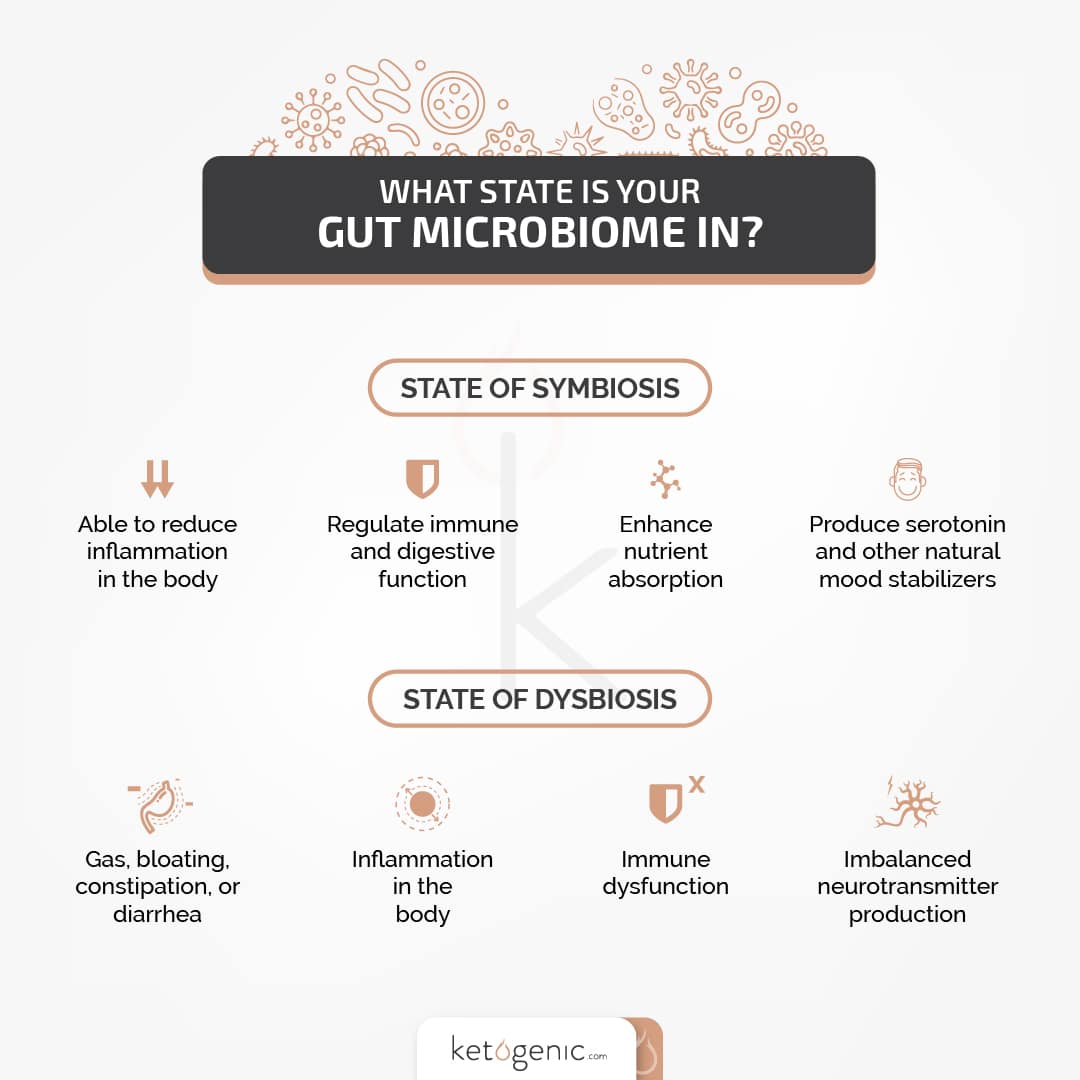
The gut microbiome is a seemingly mystical place. Research is consistently unfolding as scientists unravel the mysteries of the human gut microbiome. If you have weight loss goals, you probably want to know that your gut bacteria can affect your weight.
What is the Gut Microbiome?
You have trillions of different types of bacteria, fungi, and other microorganisms in your digestive tract that are collectively known as the gut microbiome. Most of these bacteria are good bacteria, which means they are beneficial for your health. Some, however, are considered unhealthy, pathogenic, or opportunistic.
Most of your gut microbes are found in your large intestine in a pocket called the cecum. You might be surprised to discover that you have more bacterial cells in your body than human cells. You also have up to 1,000 species of bacteria in the human gut microbiome, with each of them playing a different role in your body [1] [2].
Globally, researchers are attempting to determine what makes the gut microbiome healthy. Many questions are being asked in the scientific community, such as which bacteria are the most beneficial? How does the diversity of gut bacteria affect overall health and wellness? What about weight loss?
Several diseases have been associated with an unhealthy microbiome, including cancer, autoimmune disorders, and autism. The gut microbiome also strongly interacts with certain drugs and influences their effects, such as mental health therapeutics [3] [4].
How Can Gut Bacteria Affect Your Weight?
An overload of unhealthy microbes in your gut is often referred to as gut dysbiosis. Gut dysbiosis can lead to disease and weight gain [5].
For example, one study revealed the gut microbiome differed completely between identical twins. One twin was obese, and the other was healthy. This demonstrated that the differences in the microbiome weren’t genetic [6].
Another study showed when the microbiome from the obese twin was transferred to mice; they gained more weight compared to the mice that received the microbiome of the lean twin. This was despite the fact that both groups of mice were eating the same diet [7].

These studies are just some of the examples that show that microbiome dysbiosis might play an important role in weight gain. This begs the question; what can you do to improve the health of your gut bacteria and help you achieve your weight-loss objectives?
How Can You Improve the Health of Your Gut Microbiome?
Fortunately, you can improve the health of your gut microbiome in different ways. For example, you can take probiotics and consume delicious, nutrient-dense fermented foods to help reseed healthy bacteria in your gut. Probiotics might be helpful for weight loss, as it improves microbial diversity and gives you more healthy bacteria.
You can improve the health of your gut microbiome in various ways, such as:
- Eating a diverse range of foods
- Eating prebiotics, such as artichoke
- Limiting your intake of artificial sweeteners, which have been shown to stimulate the growth of unhealthy gut bacteria
- Consuming foods rich in polyphenols that can stimulate healthy bacterial growth [8] [9] [10] [11] [12] [13].
Research shows the ketogenic diet can positively affect your gut bacteria and might favor more beneficial types of gut bacteria. For example, the impressive impact the ketogenic diet has on conditions like epilepsy might be in part due to the changes in the microbiome [14]. Going keto could positively impact your digestive system health, gut health, and general wellness [15].
Weight loss is a complex, multifaceted picture, but going keto and improving the health of your microbiome can certainly help you on your journey.
For more on weight loss, read some of our other informative articles:
- Intermittent Fasting for Weight Loss
- Here’s Why You’re Not Losing Weight on Keto
- Are Nutrition Apps the Secret to Weight Loss on Keto?
- Keto Weight Loss Tips
- Keto for Weight Loss: What can You Expect?
Have You Lost Weight Following a Ketogenic Diet?
How has going keto altered your gut bacteria and changed your weight? Have you achieved your weight loss goals on keto?
References
Sender, R., Fuchs, S., & Milo, R. (2016). Revised estimates for the number of human and bacteria cells in the body. PLoS Biol, 14(8), e1002533. DOI: 10.1371/journal.pbio.1002533
Integrative HMP (iHMP) Research Network Consortium. (2014). The integrative human microbiome project: Dynamic analysis of microbiome-host omics profiles during periods of human health and disease. Cell Host Microbe, 16(3), 276-289. DOI: 10.1016/j.chom.2014.08.014
Shreiner, A. B., Kao, J. Y., & Young, V. B. (2015). The gut microbiome in health and disease. Curr Opin Gastroenterol, 31(1), 69-75. DOI: 10.1097/MOG.0000000000000139
Nature. (2020). The Gut Microbiome. https://www.nature.com/articles/d41586-020-00194-2
Patterson, E., Ryan, P. M., Cryan, J. F., Dinan, T. G., Ross, R. P., Fitzgerald, G. F., & Stanton, C. (2016). Gut microbiota, obesity, and diabetes. Postgrad Med J, 92(1087), 286-300. DOI: 10.1136/postgradmedj-2015-133285
Turnbaugh, P. J., Hamady, M., Yatsunenko, T., Cantarel, B. L., Duncan, A., Ley, R. E., Sogin, M. L., Jones, W. J., Roe, B. A., Affourtit, J. P., Egholm, M., Henrissat, B., Heath, A. C., Knight, R., & Gordon, J. I. (2009). A core gut microbiome in obese and lean twins. Nature, 457(7228), 480-484. DOI: 10.1038/nature07540
Ridaura, V. K., Faith, J. J., Rey, F. E., Cheng, J., Duncan, A. E., Kau, A. L., Griffin, N. W., Lombard, V., Henrissat, B., Brain, J. R., Muehlbauer, M. J., Ilkayeva, O., Semenkovich, C. F., Funai, K., Hayashi, D. K., Lyle, B. J., Martini, M. C., Ursell, L. K., Clemente, J. C., Treuren, W. V., Walters, W. A., Knight, R., Newgard, C. B., Heath, A. C., & Gordon, J. I. (2013). Cultured gut microbiota from twins discordant for obesity modulate adiposity and metabolic phenotypes in mice. Science, 341(6150), DOI: 10.1126/science.1241214
Heiman, M. L., & Greenway, F. L. (2016). A healthy gastrointestinal microbiome is dependent on dietary diversity. Mol Metab, 5(5), 317-320. DOI: 10.1016/j.molmet.2016.02.005
Alvaro, E., Andrieux, C., Rochet, V., Rigottier-Gois, L., Lepercq, P., Sutren, M., Galan, P., Duval, Y., Juste, C., & Fore, J. (2007). Composition and metabolism of the intestinal microbiota in consumers and non-consumers of yogurt. British Journal of Nutrition, 97(1), 126-133. DOI: 10.1017/S0007114507243065
Palmnas, M. S. A., Cowan, T. E., Bomhof, M. R., Su, J., Reimer, R. A., Vogel, H. J., Hittel, D. S., & Shearer, J. (2014). Low-dose aspartame consumption differentially affects gut microbiota-host metabolic interactions in the diet-induced obese rat. PLoS One, 9(10), e109841. DOI: 10.1371/journal.pone.0109841
Dewulf, E. M., Cani, P. D., Claus, S. P., Fuentes, S., Puylaert, P. G. B., Neyrinck, A. M., Bindels, L. B., De Vos, W. M., Gibson, G. R., Thissen, J-P., & Delzenne, N. M. (2013). Insight into the prebiotic concept: Lessons from an exploratory, double blind intervention study with inulin-type fructans in obese women. Gut, 62(8), 1112-1121. DOI: 10.1136/gutjnl-2012-303304
Cardona, F., Andres-Lacueva, C., Tulipani, S., Tinahones, F. J., & Quiepo-Ortuno, M. I. (2013). Benefits of polyphenols on gut microbiota and implications in huma health. J Nutr Biochem, 24(8), 1415-1422. DOI: 10.1016/j.jnutbio.2013.05.001
McFarland, L. V. (2014). Use of probiotics to correct dysbiosis of normal microbiota following disease or disruptive events: A systematic review. BMJ Open, 4(8), e005047. DOI: 10.1136/bmjopen-2014-005047
Ulamek-Koziol, M., Czuczwar, S. J., Januszewski, S., & Pluta, R. (2019). Ketogenic diet and epilepsy. Nutrients, 11(10), 2510. https://doi.org/10.3390/nu11102510
Zhang, Q., Wu, Y., & Fei, X. (2015). Effect of probiotics on body weight and body-mass index: A systematic review and meta-analysis of randomized, controlled trials. International Journal of Food Science and Nutrition, 67(5), 571-580. DOI: 10.1080/09637486.2016.1181156









